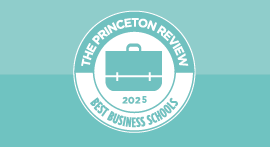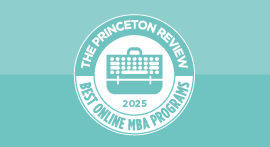From the School
First Year Curriculum
Year one of the Full-time MBA program consists primarily of the core curriculum which is designed to provide you with a disciplinary knowledge base in areas such as Accounting, Finance, Information Systems, Marketing, Operations Management, and Strategy. These core courses are offered during your first year in the program. Continual emphasis will be placed on the three main themes of the program: Strategic Innovation, Information Technology and Analytical Decision Making and how they can be leveraged for growing your business.
As an entering MBA student, you will be assigned to a specific section of approximately 50 students. You will then be assigned to a small, diverse group of 4-6 students with whom you will complete all group projects during your first year. These groups create a mutually supportive and cooperative learning environment and promote a strong sense of community among students.
You will begin your first year with a pre-term residential. This course, Management of Complex Organizations, is held off-campus at a nearby hotel to allow you to focus intensely on the subject matter and to get acquainted with classmates. You will examine basic concepts of strategic and organizational management, including group processes, competitive analysis, corporate strategy, individual and business ethics and the manager's formal and informal roles. You will be introduced to the teaching methods that you will use throughout your MBA: case analysis, group presentations and effective group work. And you will get to know a group of people who will be very important to you in the years to come--your fellow classmates.
Classes taken during your first year are:
FALL
200: Management of Complex Organizations (Residential)
201A: Statistics for Management
203A: Financial Accounting
204A: Microeconomics
207: Information Systems for Management
WINTER
202: Organizational Analysis
203B: Managerial Accounting
205: Principals of Marketing
209A: Corporate Finance
SPRING
201B: Management Science
208: Operations Management
210: Business Strategy
Elective
Second Year Curriculum
After completing the core requirements, you have the opportunity to create a unique focus by selecting a total of eleven elective classes that are multi-disciplinary or focus on the application of knowledge. Additional electives are chosen from a diverse set of options, enabling you to develop additional depth in a discipline or interdisciplinary area, or to gain expertise with a particular set of analytical or technical tools. We offer a variety of electives no matter your specialization. For example, students who want to focus on marketing can take courses in brand management, new product development, database management and business intelligence. Students specializing in finance can take courses on investments, fixed income securities, derivatives, and participate in a real world investment lab. Those interested in a consulting career focused on how information technology is transforming business can take electives on managing technological innovation, managing electronic business and technology decision-making. Students interested in operations management and consulting can take courses on forecasting, supply chain management and service operations.
During your second year you are strongly encouraged to take an experiential learning course that is designed as a practicum and will enable you to apply, test, and improve your expertise in your functional area of interest. This practicum will facilitate the application of your academic training from your core and elective classes within real companies, solving real business challenges. The Merage practicum will place you and your team, led by a faculty member, inside sponsoring companies for a 10-week consulting project. The company provides a project liaison who helps to guide your team in the completion of a superior deliverable that is immediately applicable. For more information on the practicum, please click here.
The MBA program culminates with a Capstone course that will examine broad trends such as technology, macroeconomic and geopolitical trends, and attempt to determine how these trends are likely to affect business strategies, new product development, and organization structures. A notable feature of this course is a conference featuring renowned experts in each of these topics, partnered with executives, who will interpret the impact of these trends on their businesses. You will be given assignments focused on analyzing the impact of these trends on a specific business or industry. Examples of these include the impact of technology trends on the music industry, new product offerings for growing demographic categories (aging baby boomers, Latinos), building and leading globally networked enterprises, etc. You will also be provided with access to senior executives, who will guide you in your analysis. At the culmination of the course all teams will present the results of their analysis to faculty and business leaders.
The Paul Merage School of Business recognizes explicitly that we need to simultaneously prepare you for positions immediately after your MBA degree, as well as for your leadership roles in the future. We believe our program will provide you with both short and long-term capabilities and knowledge, and will equip you for a productive and successful career.




